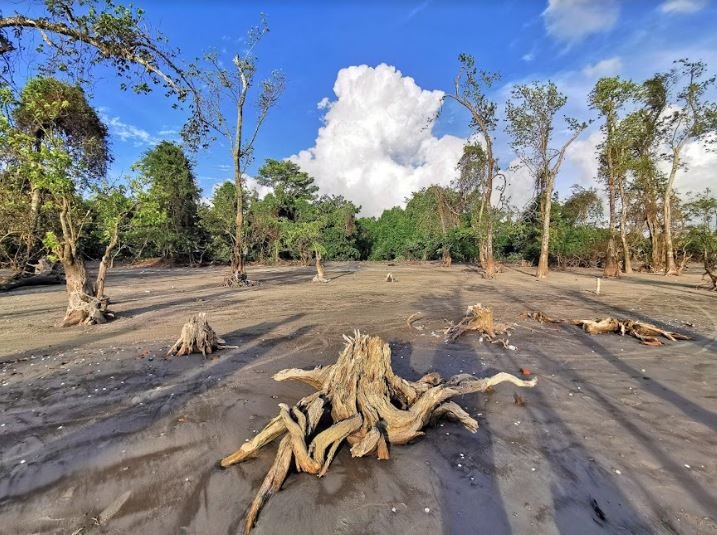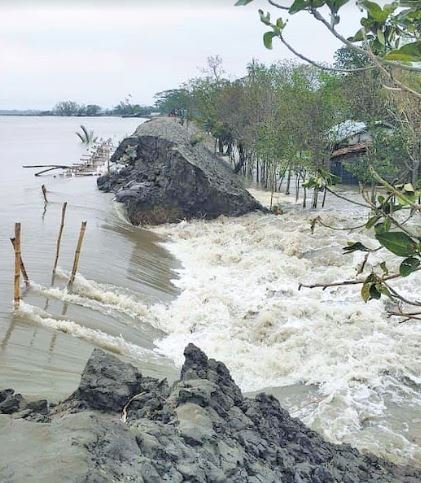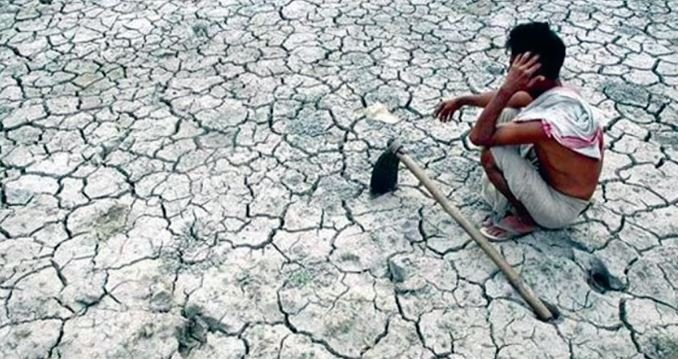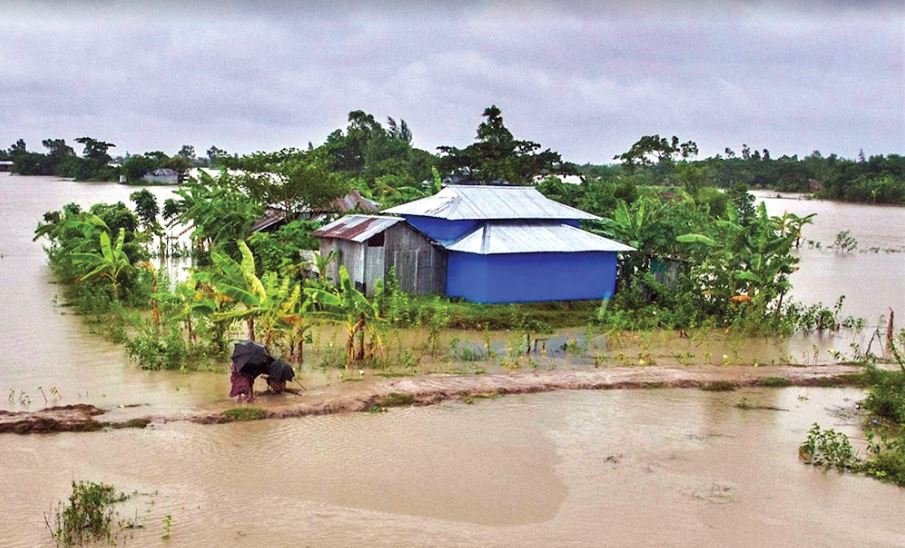Coronavirus pandemic has apparently wreaked havoc on people’s lives and livelihoods globally, while simultaneously reducing CO2 emissions dramatically. Governments are pouring trillions of dollars into COVID-19 recovery. It is within their power to direct investments that will secure a more sustainable growth path. However, fiscal stimulus to carbon-intensive industries has been at least 12 times greater than to low-carbon sectors, and global emissions are expected to rebound quickly.
Climate change is one of the greatest challenges of the 21st century as increasing evidence of the impacts of climate change and those human actions are contributing to changes in climate. There is a growing apprehension across the world that attaining the consensus and commitment needed to take action call for positioning climate change in a broader foreign policy context. The perceived goal of traditional foreign policy is to provide stability and security as a foundation for human well-being, global harmony, freedom and prosperity. However, in today’s increasingly inter-connected world, the traditional instruments of diplomacy are not always effective in tackling global threats.
Climate Diplomacy: New Era in international relations
In order to address the climate change challenges, it requires new thinking in foreign policy—thinking that considers engagement on climate change not only in the sphere of environment, but also outside the milieu container. Science (climate scientists) and politics (diplomats and foreign ministry officials) may not always speak the same language, but climate diplomacy inevitably brings them together into a “marriage of convenience”.
Climate diplomacy is also characterized by complex linkages between foreign and domestic policy and politics the connection between foreign and domestic policy inherent in environmental diplomacy. It helps bring new actors to the fore successful environmental diplomacy demanding a cooperative, multilateral approach healthy competition for the mantle of international environmental leadership is needed to reinvigorate global environmental diplomacy. Environmental issues are increasingly intertwined with other more traditional areas of foreign relations, including trade and investment, development and human rights and even military security. Climate diplomacy as the new dimension of diplomacy could be flourished in the form of bilateral diplomacy, track-II diplomacy, multilateral diplomacy as well as cultural diplomacy.
Climate diplomacy tries to influence foreign governments and/or multilateral institutions towards certain policies and it seems clearly to have emerged as an integral component of international relations to complement the national efforts through tie up with international affiliations in mitigating and adapting the climate change. Climate change is growing in importance as a significant new arena of global diplomacy at the very highest levels.
Climate Change: Potential Threats towards Lives and Livelihood in Bangladesh
As a developing country that is particularly vulnerable to the adverse impacts of climate change this presents a challenge for Bangladesh. At the same time, as the country gains in knowledge about the issue and starts to tackle it in earnest, it also represents an opportunity for it to play a leading role in the international diplomatic arena as well. In order to make the most of such opportunities different ministries of the government will need to enhance their capacities on the issue of climate diplomacy.
Bangladesh is a low-lying deltaic country in south Asia formed by the Ganges, the Bharmaputra and the Meghna rivers. The country enjoys a humid, warm, tropical climate. Its climate is influenced primarily by monsoon and partly by pre-monsoon and post-monsoon circulations. There is an increasing realization in the international community that achieving the consensus and commitment needed to take action requires positioning climate change in a broader foreign policy context.
The ostensible goal of western foreign policy is to provide stability and security as a foundation for human well-being, global freedom and prosperity. However, in today’s increasingly inter-connected world, the traditional instruments of diplomacy are not always effective in tackling global threats. Established alliances and procedures are hard-pressed to be effective against a threat such as climate change, when the cause (greenhouse gas emissions) is not the ambition of any one “hostile” power.
Addressing the climate change challenge requires new thinking in foreign policy—thinking that considers engagement on climate change not only in the sphere of environment, but also outside the environment box. The country pursues a moderate foreign policy that places heavy reliance on multinational diplomacy, especially at the United Nations. Since independence in 1971, the country has stressed its principle of friendship towards all, malice towards none in dictating its diplomacy.

How is Bangladesh pursuing Climate Negotiations?
As a member of the non-aligned movement, Bangladesh has tended to not take sides with major powers. Since the end of the cold war, the country has pursued better relations with regional neighbors. One of the core principles of the foreign policy of Bangladesh is to uphold the right of every people freely to determine and build up its own social, economic and political system by ways and means of its own free choice. This is a sign of venture of Bangladesh to ensure the right of its climate change affected communities. In an attempt to address the fundamental concerns, negotiation across level has emerged as an impending and worthwhile force for Bangladesh.
Bangladesh as a Chair of the CVF is constantly questioning the developed countries to extend a helping hand to the most vulnerable countries by providing clean and green technology at affordable prices. Bangladesh is also serious at the global forum with regard to the sharing of global responsibilities for migrants displaced by rising sea levels, rising salinity, river erosion, floods, and droughts.
Recognizing the urgency of the issue, Bangladesh has become one of the most active countries in the field of climate change planning and action. Bangladesh accounts for less than 0.35 percent of global greenhouse gas emissions, but it has taken a number of steps in recent years to encourage climate change investment. The key is to adopt a financial structure designed to channel more resources towards adaptation investment. At the same time the new environmental guidelines encourage green financing, green banking and the establishment of dedicated funds. Bangladesh is active in getting grants, especially from the international community, through the Green Climate Fund.
Bangladesh drives towards Climate Change Adaption
Bangladesh, an initiative is underway to establish a public-private partnership system and a complete social system to establish a national mechanism on loss and damage, where the Reserve Fund under the Bangladesh Climate Change Trust Fund (BCCTF) has been set up to date at USD 100 million. Over the years, Bangladesh intensified its effort to tackle climate change through the development of the Bangladesh Climate Change Strategy and Action Plan (BCCSAP). BCCSAP strongly emphasizes fruitful negotiation involving expert envoy(s) at the national and internal levels to address the worst impact of climate change.
The Bangladesh Climate Change Strategy and Action Plan (BCCSAP) is a knowledge strategy built upon the National Adaptation Programme of Action (2005). It sets out 44 programmes to be taken by Bangladesh over the short, medium and long term within six strategic areas (food security, social protection and health; comprehensive disaster management; infrastructure; research and knowledge management; mitigation and low carbon development; and capacity building and institutional strengthening). The National Adaptation Programme for Action (NAPA) highlighted the prediction on changing patterns of temperature, rainfall, and sea-level rise in Bangladesh due to climate change impact.

We need to raise our voice for inclusive green economy to accelerate adaptation and mitigation. Green economy improves human well-being and social equity while mitigating environmental risks and scarcity. An inclusive green economy is a viable alternative to today’s dominant economic model, which exacerbates inequalities, promotes waste, causes resource scarcity, and poses widespread threats to the environment and human health.
Highlighting Green Economy for better Climate Change Adaption
Let me talk about the concept of green economy. Green economy has emerged as a strategic priority for many governments over the last decade. These countries will be better prepared to face the major challenges of the twenty-first century, such as urbanization and resource scarcity, as well as climate change and economic volatility, if they transform their economies into drivers of sustainability.
Apparently, the coronavirus pandemic has wreaked havoc on people’s lives and livelihoods worldwide, while simultaneously reducing CO2 emissions dramatically. Governments are pouring trillions of dollars into COVID-19 recovery. It is within their power to direct investments that will secure a more sustainable growth path. However, fiscal stimulus to carbon-intensive industries has been at least 12 times greater than to low-carbon sectors, and global emissions are expected to rebound quickly.
The European Union adopted the European Climate Act in March 2021, which set a target of reducing greenhouse gas (GHG) emissions by at least 55% by 2030 and making climate neutrality legally binding by 2050. Recent data from 2019 indicates that the EU as a whole and most member states, individually, were on track to achieve the 2020 renewable energy target, thanks in part to lower prices for key technologies such as wind and solar in recent years. So far, at least USD 151 billion has been pledged to fossil fuels, and only 20% of those pledges have green strings attached.
Bangladesh is among those that experience the most adverse consequences of climate change such as frequent flooding, severe cyclones and shifting rainfall patterns. Climate change affects all sectors of the country’s economy. Bangladesh is a land of vast coastlines, great rivers, and resilient people. However, 2020 has been a true litmus test for Bangladeshis. Cyclone Amphan wreaked havoc in the south-western parts of the country in May, and then monsoon rains stranded one-third of the country, displacing thousands of people and destroying vast swaths of crops.
Rapid economic growth and huge population pressure are contributing to environmental degradation in Bangladesh, with the ongoing COVID-19 pandemic exacerbating the situation even further. We may need sustainable recovery measures, not a linear economic recovery and need to generate more critical pieces as well as more convincing soundbites and research on the areas for green recovery measures, potential green investments such as green energy, green urban planning, energy efficiency.

Can Bangladesh deliver best for Climate Change Adaption and Mitigation in post COP26?
Referring to the COP26 held in Glasgow, adaptation and its financing were discussed in every phases of the conference. COP26 has also witnessed the highest ever commitments of climate finance to vulnerable low-income countries, about USD 450 million, as well as a commitment of USD 232 million to the Adaptation Fund, also the highest ever committed in a year. This fund can be accessed by all developing countries.

Bangladesh is persistent to appraise the global community about the cartoon emissions. Bangladesh strongly voices that, countries that are playing the biggest role in carbon emissions need to formulate and implement a specific ambitious plan in the form of National Determined Contribution. Bangladesh in favor of reducing the damage caused by climate change and therefore, it urges upon the developed countries to set up a pledged fund of USD 1 billion annually and allocate half of it for adaptation and mitigation.
Bangladesh pursues a moderate foreign policy that places heavy reliance on multinational diplomacy, especially at the United Nations. Bangladesh’s endeavor towards making the best use of diplomatic affiliation in an attempt to address the issue of climate change is noticeable. Bangladesh should attempt to strengthen the cooperation in this regard on the basis of “equal consultation, mutual benefit, and common development. The Ministry of Foreign Affairs (MoFA) to the government of Bangladesh has a major role to play in global climate negotiations. Bangladesh is found to display an effective role in this area.
To achieve the vision of becoming a middle-income country by 2021 and a rich country by 2041, Bangladesh must be capable of integrating all aspects of climate change into its planning and delivery of services to the citizens and ecosystems. The great move we had observed on May 14, 2018, as the cabinet changed the name to Ministry of Environment, Forest and Climate Change. Bangladesh’s endeavor towards making the best use of diplomatic affiliation in an attempt to address the issue of climate change is noticeable.

Bangladesh should keep the advocacy persistent to convenience the developed countries to set up a pledged fund of USD 1 billion annually and allocate half of it for adaptation and mitigation. Bangladesh as a Chair of the CVF should convey the same message like the past to the developed countries for providing clean and green technology to the developing countries at affordable prices. Last but not least Bangladesh must advocate for the welfare of the migrants displaced because of climate change.
We need to understand and consider that COP, which occurs once a year, is not the only place where climate diplomacy takes place. Indeed, every diplomat at the Bangladesh Embassy worldwide now has to make tackling climate change a key issue in bilateral talks with the host government. In developed countries, it would be in our interest to encourage them to fulfill the commitments made in the Paris Agreement.
Role of global community for win-win outcomes of COP26
The global community must be aware of that helping others are helping oneself and harming others is harming oneself, actively tackle climate change, and work together to make our homeland a better place. Bangladesh’s participation in the multilateral dialogues has been shown to be an indicative of its integration into the global society. Bangladesh badly needs the financial and technological support of the west to adopt with the change posed due to climate change. Rhetorically, Bangladesh finds it more feasible to speak of the needs of all developing nations as a group rather than its own interests.
It should be emphasized that by focusing on environmental issues we are not asking for more aid or charity but rather for international recognition of the environmental importance of Bangladesh. It is a technical and knowledge-intensive affair and all delegations to international negotiations/conferences should be formed accordingly. Delegation members should be selected with appropriate background, continuity in participation and institutional expertise/memory developed over time.
Multilateral diplomacy is not just important but engrained in the conduct of Bangladesh’s foreign policy since the country gained its independence. Bangladesh has been working actively towards a global political and socio-economic stability and security within the multilateral system. Bangladesh will therefore promote security, international law as well as development through its active participation in the international fora, especially the United Nations system and its specialized agencies.
UN must be persistent in Multilateralism
The United Nations through its universal membership and its charter occupies the central and indispensable role within a multilateral system of governance. Bangladesh recognizes the need to address the pressing social and economic needs of the developing countries and as such looks to the united nations to advance the development agenda related to underdevelopment and the eradication of poverty. Through Bangladesh’s participation in the multilateral fora, Bangladesh has to be vocal with the belief that resolution of international conflict should be peaceful and in accordance with the United Nations and international law.


Can Bangladesh set an example of vibrant Climate Diplomacy?
Considering the importance of this issue for Bangladesh in the future, the appointment of a personal “Special Climate Change Envoy/ Adviser” to Bangladesh should be considered to ensure effective representation of Bangladesh in important high-level international meetings. Both developed and developing countries have appointed such “special climate change envoys / advisers”. However, the favorable image of Bangladesh as a collaborating partner of the international community should be maintained. Fear of losing face can limit his behavior. In particular, the Government of Bangladesh, especially the Ministry of Foreign Affairs, must be applauded for its diplomatic talks on a win-win agreement.


